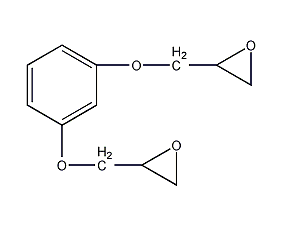
Structural formula
| Business number | 02LA |
|---|---|
| Molecular formula | C12H14O4 |
| Molecular weight | 222.24 |
| label |
m-bis(2,3-epoxypropyl)benzene, Resorcin diglycidyl ether, 1,3-Benzodiphenol diglycidyl ether, Resorcin diglycidyl ether, 1,3-Bis(glycidyloxy)benzene |
Numbering system
CAS number:101-90-6
MDL number:MFCD00078378
EINECS number:202-987-5
RTECS number:VH1050000
BRN number:203671
PubChem number:24870691
Physical property data
1. Characteristics: Colorless solid , with a slight phenol smell.
2. Density (g/mL,20℃): 1.12
3. Relative vapor density ( g/mL,Air=1):7.95
4. Melting point (ºC):32- 33
5. Boiling point (ºC,normal pressure): Undetermined
6. Boiling point (ºC, 0.007KPa): 150-160
7. Refractive index:1.542
8. Flashpoint (ºC): Undetermined
9. Specific rotation (º): Undetermined
10. Autoignition point or ignition temperature (ºC): Undetermined
11. Vapor pressure (mmHg,20ºC): Undetermined
12. Saturated vapor pressure (kPa, 208-210ºC):1.60
13. Heat of combustion (KJ/mol): Undetermined
14. Critical temperature (ºC): Undetermined
15. Critical pressure (KPa): Undetermined
16. Oil and water (octanol/Log value of the partition coefficient for water: undetermined
17. Explosion upper limit (%,V/V): Undetermined
18. Lower explosion limit (%,V/V): Undetermined
19. Solubility: Undetermined
Toxicological data
1. Irritating:Severe irritation to eyes; moderate irritation to skin after one exposure; severe irritation after repeated application, causing skin to look leathery.
2. Acute toxicity: Rat oral LD50: 2570mg/kg
Orally administered to mice LD5O: 980mg/kg
Ecological data
This substance is slightly harmful to water.
Molecular structure data
None yet
Compute chemical data
1. Reference value for hydrophobic parameter calculation (XlogP): 1.2
2. Number of hydrogen bond donors: 0
3. Number of hydrogen bond acceptors: 4
4. Number of rotatable chemical bonds: 6
5. Number of tautomers: none
6. Topological molecule polar surface area 43.5
7. Number of heavy atoms: 16
8. Surface charge: 0
9. Complexity: 211
10. Number of isotope atoms: 0
11. Determine the number of atomic stereocenters: 0
12. Uncertain number of atomic stereocenters: 2
13. Determine the number of chemical bond stereocenters: 0
14. Number of uncertain chemical bond stereocenters: 0
15. Number of covalent bond units: 1
Properties and stability
Avoid contact with strong oxidants.
Storage method
Stored in a cool, ventilated warehouse. Keep away from fire and heat sources. should be kept away from oxidizer, do not store together. Equipped with the appropriate variety and quantity of fire equipment. The storage area should be equipped with suitable materials to contain leaks
Leakage.
Synthesis method
Using o-toluidine as raw material, It is first salted with hydrochloric acid, then diazotized with sodium nitrite, then coupled with o-toluidine, translocated, and then salted with hydrochloric acid. Raw material consumption(kg/t0O-toluidine (100%) 890 Hydrochloric acid (31%) 1100Sodium nitrite (98%) 285Refined salt (industrial product) 540
Purpose
Used as a stabilizer for epoxy resin organic compounds, curing agent for polysulfide rubber and protein adhesives.
ang=EN-US>
Molecular structure data
None yet
Compute chemical data
1. Reference value for hydrophobic parameter calculation (XlogP): 1.2
2. Number of hydrogen bond donors: 0
3. Number of hydrogen bond acceptors: 4
4. Number of rotatable chemical bonds: 6
5. Number of tautomers: none
6. Topological molecule polar surface area 43.5
7. Number of heavy atoms: 16
8. Surface charge: 0
9. Complexity: 211
10. Number of isotope atoms: 0
11. Determine the number of atomic stereocenters: 0
12. Uncertain number of atomic stereocenters: 2
13. Determine the number of chemical bond stereocenters: 0
14. Number of uncertain chemical bond stereocenters: 0
15. Number of covalent bond units: 1
Properties and stability
Avoid contact with strong oxidants.
Storage method
Stored in a cool, ventilated warehouse. Keep away from fire and heat sources. should be kept away from oxidizer, do not store together. Equipped with the appropriate variety and quantity of fire equipment. The storage area should be equipped with suitable materials to contain leaks
Leakage.
Synthesis method
Using o-toluidine as raw material, It is first salted with hydrochloric acid, then diazotized with sodium nitrite, then coupled with o-toluidine, translocated, and then salted with hydrochloric acid. Raw material consumption(kg/t0O-toluidine (100%) 890 Hydrochloric acid (31%) 1100Sodium nitrite (98%) 285Refined salt (industrial product) 540
Purpose
Used as a stabilizer for epoxy resin organic compounds, curing agent for polysulfide rubber and protein adhesives.

 微信扫一扫打赏
微信扫一扫打赏

